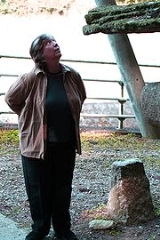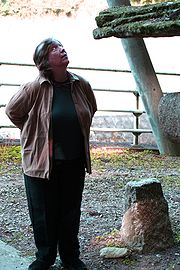
Juliet Winters Carpenter
Encyclopedia

Japanese literature
Early works of Japanese literature were heavily influenced by cultural contact with China and Chinese literature, often written in Classical Chinese. Indian literature also had an influence through the diffusion of Buddhism in Japan...
at the University of Michigan
University of Michigan
The University of Michigan is a public research university located in Ann Arbor, Michigan in the United States. It is the state's oldest university and the flagship campus of the University of Michigan...
and the Inter-University Centre for Japanese Language Studies in Tokyo
Tokyo
, ; officially , is one of the 47 prefectures of Japan. Tokyo is the capital of Japan, the center of the Greater Tokyo Area, and the largest metropolitan area of Japan. It is the seat of the Japanese government and the Imperial Palace, and the home of the Japanese Imperial Family...
. After completing her graduate studies in 1973, she returned to Japan, where she became involved in translation efforts.
Carpenter is a devotee of traditional Japanese music and is a licensed instructor of the koto
Koto (musical instrument)
The koto is a traditional Japanese stringed musical instrument, similar to the Chinese guzheng, the Mongolian yatga, the Korean gayageum and the Vietnamese đàn tranh. The koto is the national instrument of Japan. Koto are about length, and made from kiri wood...
and shamisen
Shamisen
The , also called is a three-stringed, Japanese musical instrument played with a plectrum called a bachi. The Japanese pronunciation is usually "shamisen" but sometimes "jamisen" when used as a suffix . -Construction:The shamisen is a plucked stringed instrument...
. She teaches at Doshisha Women's College of Liberal Arts in Kyoto
Kyoto
is a city in the central part of the island of Honshū, Japan. It has a population close to 1.5 million. Formerly the imperial capital of Japan, it is now the capital of Kyoto Prefecture, as well as a major part of the Osaka-Kobe-Kyoto metropolitan area.-History:...
and is a member of the Japanese Literature Publishing Project (JLPP), a government-supported project translating and publishing Japanese books overseas.
Translations
| Title | Author | Type |
| The Ark Sakura | Abe Kōbō Kobo Abe , pseudonym of was a Japanese writer, playwright, photographer and inventor. Abe has been often compared to Franz Kafka and Alberto Moravia for his surreal, often nightmarish explorations of individuals in contemporary society and his modernist sensibilities.... |
Novel |
| Beyond the Curve | Abe Kōbō | |
| Secret Rendezvous | Abe Kōbō | Novel |
| The Hunter | Asa Nonami | |
| Uncommon Clay | Sidney B. Cardozo and Masaaki Hirano Masaaki Hirano was a Japanese food historian from the city of Futtsu, Chiba. He was a courtesy member of the Cultural Academic Society. He wrote under the pen name Masaaki.... |
|
| Masks | Enchi Fumiko | |
| The Quickening Field | Hachikai Mimi | |
| Biruma | Hiwa Satoko | |
| Waiting on the Weather: Making Movies with Akira Kurosawa | Teruyo Nogami | |
| Shadow Family | Miyabe Miyuki Miyuki Miyabe Miyuki Miyabe is a popular contemporary Japanese author active in a number of genres that include science fiction, mystery fiction, historical fiction, social commentary, and juvenile fiction... |
Novel |
| Memories of Wind and Waves: A Self-Portrait of Lakeside Japan | Saga Junichi | |
| The Last Shogun: The Life of Tokugawa Yoshinobu | Shiba Ryōtarō Ryotaro Shiba , born in Osaka, Japan, was a Japanese author best known for his novels about historical events in Japan and on the Northeast Asian sub-continent, as well as his historical and cultural essays pertaining to Japan and its relationship to the rest of the world.... |
|
| You Were Born for a Reason | Kentetsu Takamori, Daiji Akehashi, and Kentaro Ito Kentaro Ito is a seiyū who was born in Hachiōji, Tokyo, Japan. He has been affiliated with Mediarte since May 2009.- Notable anime roles :* Ai No Kusabi - Riki* Ao no Exorcist - Shiratori/Astaroth* Bakusō Kyōdai Let's & Go!! WGP - Brett Astaire... |
|
| Salad Anniversary | Tawara Machi Machi Tawara is a contemporary Japanese writer, translator and poet.Tawara is most famous as a contemporary poet. She is credited with revitalizing the tanka for modern Japanese audiences... |
Tanka Tanka Tanka may refer to:* Tanka, a form of Japanese waka * Tanka prose, a literary genre which combines tanka poems and prose* Thangka, a pictorial representation in Tibetan Buddhism... |
| After | Wagō Ryōichi | |
| A Lost Paradise A Lost Paradise is 1997 novel by Japanese author Junichi Watanabe. It tells the story of a 54-year-old married former magazine editor, his affair with a 37-year-old married typesetter and their double-suicide. The couple, Kūki and Rinko, are modeled after the famous case of Sada Abe.The book became a bestseller... |
Watanabe Junichi Junichi Watanabe is a Japanese writer, known for his portrayal of extra-marital affairs of middle aged people. His 1997 novel A Lost Paradise became a bestseller in Japan and over Asia, and was made into a film and a TV miniseries... |
Novel |
| The Sail of My Soul | Yamaguchi Seishi | Haiku Haiku ' , plural haiku, is a very short form of Japanese poetry typically characterised by three qualities:* The essence of haiku is "cutting"... |

